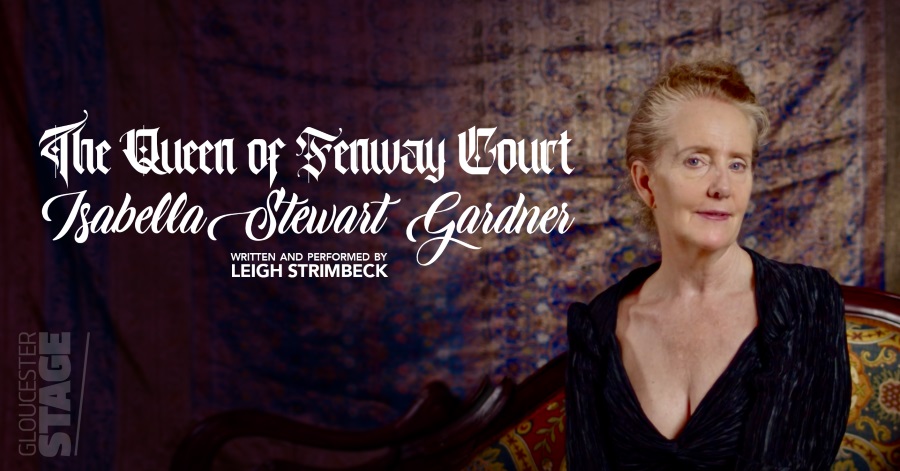
‘The Queen of Fenway Court: Isabella Stewart Gardner’ – Written and Performed by Leigh Strimbeck; Directed by Joshua Briggs; Original Music by Jan Jurchak. Produced by Gloucester Stage Company at Oneline/Virtual Space as part of its 2020 Never Dark Series. Streaming online August 6-9.
By Shelley A. Sackett
Isabella Stewart Gardner’s legacy is synonymous with that of her namesake museum, Fenway Court. Part arboretum, part concert hall, and part cultural repository, the building houses the eccentric millionaires’ collection of art, sculpture, tapestries and more in a gilded Italian confection that reflects its creator’s love affair with the Italian Renaissance.
Just as a visit to the museum titillates and seduces the visitor with romantic corridors and hidden treasures, so does Leigh Strimbeck’s spectacular performance as the spirited and indomitable Mrs. Gardner lead us down a magical path that unveils this complex firecracker of a Bostonian Brahmin’s wife. For just under an hour, Strimbeck (who wrote the one-woman script) is Isabella Stewart Gardner and we are her confidantes as she tells the story of her life from a 20-year-old newlywed in 1860’s Boston to the widowed hostess at the opening of her beloved museum in 1903.
And what a story it is.
Strimbeck (a terrific storyteller) is on camera for the entire 56 minutes of this “Theatre on Film” production, and neither the camera nor the audience can get enough of her. By the end of the monologue, we feel like we’ve barely scratched the surface of this enigmatic powerhouse.
As instructive as it is entertaining, ‘The Queen of Fenway Court: Isabella Stewart Gardner introduces Isabella as she struggles with her life as an ebullient, headstrong and feisty young wife stuck in uptight, staid, class-obsessed Boston. She quickly abandons any thought of reining in her temperament to “blend in,” and soon she is the belle of the ball and talk of the town – not all of it flattering.
To the woman bragging about her ancestors being among the first to arrive in Boston, Isabella cracks, “Yes. They were much less careful about immigration in those days.” She takes a lion on a walk on a dare and attends dances alone while her equally independent and modern husband Jack (a monied Peabody by birth, a banker by trade) takes refuge in his club. “I obey the rules when they suit me,” she deadpans, her playful eyes dancing roguishly.
Her life takes a U-turn with the birth and death at age 2 of her only child, a son. “My heart sweated,” she says. “Where is God in all of this?” When she suffers a miscarriage and subsequent hysterectomy, her husband whisks her off to Europe and Egypt to recover, planting the seed of the second great romance that will dominate her life: a love for travel. “Travel is the way out and the way back,” she says.
She returns to Italy with a companion (she has many, mostly male and all allegedly platonic) and finds both her true passion and her voice in sensational Venice, the antidote to functional and stoic Boston with its 50 gloomy shades of wintry gray. When she answers the “call to the hunt” and purchases her first painting, Titian’s “The Rape of Europa,” (which she hopes is “enough to turn any Puritan to a Bacchante”), she discovers her true calling: to collect art for art’s sake. Eyes ablaze, she triumphantly crows after bagging the prized Titian at her first auction, “I vow to live out loud.”
When she returns to Boston, her goals are straightforward: to bring the visual feast of Italy to Boston while, whenever possible, scandalizing its uptight Victorian inhabitants. She and her beloved Jack will build a palazzo to house her carefully curated collection. When he dies midway through the project, however, she decides to live there alone and builds her cozy fourth-floor apartment.
Full-bodied and clad in the black velvet dress and ruby necklace made famous in John Singer Sargent’s portrait, Strimbeck channels Isabella and all her inconsistencies, quirkiness and charm. She wears both halo and crown and, in the blink of an eye, shifts from steely and unwavering to coquettish and fun-loving and back again to shrewd and fearless. Her voice is nuanced, the pacing interesting and intimate. All this makes for great storytelling and enchanting theater.
Isabella Stewart Gardner’s art and her museum are her last dance and her last love. Above the entrance is the motto, “C’est mon Plaisir.” (this is my delight). After spending an hour getting to know and understand Isabella/Strimbeck, revisiting this literal palace in the hopefully not too distant future will also be nos plaisirs. Merci, Isabella.
For tickets and information, go to: gloucesterstage.com

